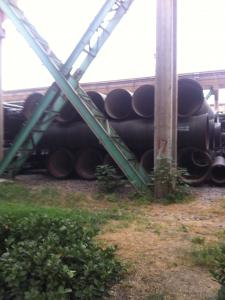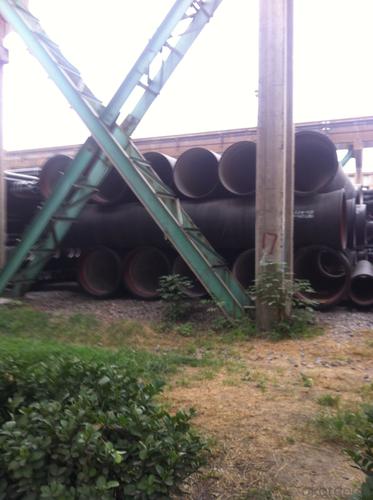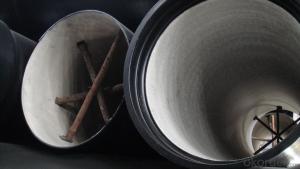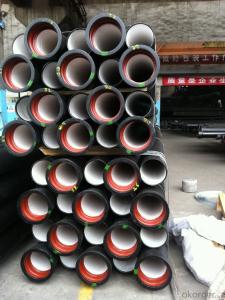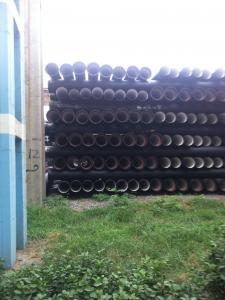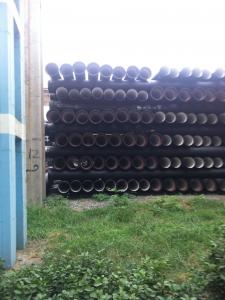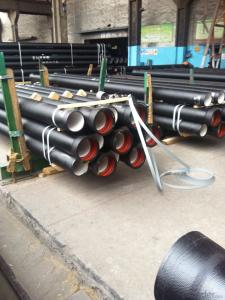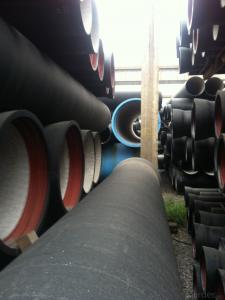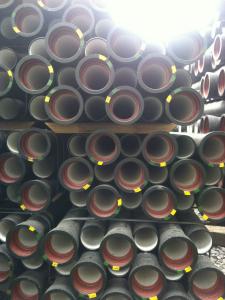DUCTILE IRON PIPES AND PIPE FITTINGS K9 CLASS DN250
- Loading Port:
- Tianjin
- Payment Terms:
- TT OR LC
- Min Order Qty:
- 22 pc
- Supply Capability:
- 3000 pc/month
OKorder Service Pledge
OKorder Financial Service
You Might Also Like
Material : Ductile Cast Iron
Size Range : DN 80mm to DN 2000mm
Unit Effective Length : 6m or 5.7m
Manufacture Standard: ISO 2531:1998/ EN 545:2006/EN 598:2007
Annual capacity : 200,000 tons
Coating Exterior: Zinc 130g/m2 according to ISO 8179-1 and bitumen coating 70 microns.
Cement Interior: Portland Cement/ High Alumina Cement/ Sulphate Resisting Cement Lining according to ISO 4179
Special requirements on external coating and internal lining can be applied
We also provide accessories such as SBR/EPDM rubber gaskets, lubricant paste, pipe caps, PE sleeves, etc.
Additional Parts:
Each pipe is strictly inspected according to related standard to ensure permanently high performance.
Easy Installation at site and service free for life
Long Service Lifespan
Quotation will arrive you within 24hours once we get your inquiry.
We guarantee offering you a competitive price.
A copy of original inspection reports of pipes will be offered after shipment.
Photos of loading process will be sent to the customer after shipment effect.
We will follow-up the delivery progress after shipment effect and update to the customer on weekly basis.
- Q: Can ductile iron pipes be used in culvert or storm sewer applications?
- Yes, ductile iron pipes can definitely be used in culvert or storm sewer applications. Ductile iron pipes are known for their strength, durability, and flexibility, making them ideal for such applications. They have the ability to withstand heavy loads, resist corrosion, and handle high flow rates, making them a reliable choice for culverts and storm sewers. Ductile iron pipes also have a long service life and require minimal maintenance, further adding to their suitability for these applications. Additionally, ductile iron pipes can be easily installed and are available in various sizes and configurations to meet the specific requirements of culvert or storm sewer projects. Overall, ductile iron pipes are a proven and widely used option for culvert or storm sewer applications, providing efficient and long-lasting performance.
- Q: How are ductile iron pipes protected against external corrosion?
- Ductile iron pipes are protected against external corrosion through a combination of manufacturing processes and external coatings. The first line of defense is the inherent corrosion resistance of ductile iron itself. The iron is treated with a special alloying element, typically magnesium, which forms a protective layer on the surface of the pipe. This layer acts as a barrier against corrosion and helps to extend the lifespan of the pipe. In addition to the corrosion-resistant properties of the iron, ductile iron pipes are also externally coated with protective materials. One common method is to apply a layer of asphaltic or bituminous coating to the pipe's surface. This coating acts as a barrier against moisture and corrosive substances in the soil, preventing them from coming into contact with the iron. It also provides a layer of insulation, reducing the likelihood of galvanic corrosion. Another method of external corrosion protection is the use of fusion-bonded epoxy (FBE) coatings. FBE is a thermosetting resin that is applied to the surface of the pipe and then heat-cured to form a strong and durable coating. This coating provides excellent resistance against corrosion, abrasion, and impact, making it a popular choice for ductile iron pipes in harsh environments. In some cases, additional protective measures such as cathodic protection systems may be employed. These systems use electric currents to counteract the corrosion process by supplying electrons to the pipe's surface. This helps to prevent corrosion from occurring, especially in areas where the coating may have been damaged or compromised. Regular maintenance and inspection are also crucial in ensuring the long-term protection of ductile iron pipes against external corrosion. This includes periodic cleaning, repair of any coating damages, and monitoring the integrity of the protective layers. Overall, the combination of the inherent corrosion resistance of ductile iron, external coatings, and maintenance practices ensures that ductile iron pipes are well-protected against external corrosion, allowing them to have a longer lifespan and deliver reliable performance in various applications.
- Q: What is the weight of ductile iron pipes compared to other materials?
- Compared to other commonly used materials in the construction industry, ductile iron pipes tend to be heavier. The weight of these pipes can vary depending on their specific size and dimensions, but they are usually heavier than materials like PVC, HDPE, and steel pipes. The primary reason for this increased weight is the dense nature of ductile iron, which grants it durability, strength, and resistance to corrosion. However, this weight also presents challenges in terms of transportation, installation, and handling, necessitating appropriate equipment and techniques for safe and efficient installation. Despite being heavier, ductile iron pipes offer numerous advantages in terms of longevity and performance in various applications.
- Q: How does ductile iron pipe perform in areas with high soil erosion?
- Ductile iron pipe performs well in areas with high soil erosion due to its inherent strength and durability. Its thick walls and strong composition make it resistant to external pressures, including the erosive forces of soil. The pipe's ability to withstand the effects of soil erosion helps ensure its long-term performance and reliability in such challenging environments.
- Q: How does ductile iron pipe handle soil movement?
- Ductile iron pipe has excellent resistance to soil movement due to its high flexibility and strength. It can withstand ground settlement, soil shifting, and other forms of soil movement without cracking or breaking. The pipe's ductility allows it to absorb the stress and strain caused by soil movement, making it a reliable and durable choice for underground pipelines.
- Q: Are there any specific standards or specifications for ductile iron pipes?
- Ductile iron pipes have specific standards and specifications that must be adhered to. The American Water Works Association (AWWA) and the International Organization for Standardization (ISO) are responsible for establishing the most commonly used standards for these pipes. AWWA has developed the AWWA C151 standard, which covers everything from design and manufacturing to testing, installation, and maintenance requirements for ductile iron pipes used in water and wastewater applications. This standard outlines the materials, dimensions, and mechanical properties of the pipes, as well as the necessary coatings and linings. Similarly, ISO has created the ISO 2531 standard, which provides guidelines for the design, manufacturing, testing, and installation of ductile iron pipes in water and wastewater systems. This standard addresses various aspects, including dimensions, mechanical properties, coatings, and linings. In addition to these well-known standards, there may be other regional or national standards that are specific to certain countries or regions. These standards typically align with the AWWA and ISO standards or may have additional requirements that are specific to local conditions or regulations. Compliance with these standards ensures that ductile iron pipes meet the required quality and performance standards. It also promotes the interoperability and compatibility of ductile iron pipes across different systems and countries, which in turn enables reliable and efficient water distribution and wastewater management.
- Q: The design uses water supply ductile iron pipe, PE corrosion protection pipe, HDPE pipe, please ask that good? What's the price of the two?
- Now the mainstream is PE pipe, ductile iron pipe has been going out.
- Q: What are the advantages of using ductile iron pipe?
- There are several advantages of using ductile iron pipe. Firstly, it has a high tensile strength, allowing it to withstand high-pressure conditions without deformation or bursting. Secondly, it has excellent corrosion resistance, making it suitable for use in various environments, including underground and underwater applications. Additionally, ductile iron pipe is highly durable and long-lasting, reducing the need for frequent replacements. It is also resistant to fire and has good seismic performance. Lastly, ductile iron pipe offers easy installation and maintenance due to its flexibility and adaptability.
- Q: Can ductile iron pipes be used in areas with high soil acidity and alkalinity?
- Yes, ductile iron pipes can be used in areas with high soil acidity and alkalinity. Ductile iron is highly resistant to corrosion and can withstand extreme pH levels, making it suitable for such environments.
- Q: Can ductile iron pipes be used in areas with high water velocity?
- Yes, ductile iron pipes can generally be used in areas with high water velocity. Ductile iron is known for its strength and durability, making it suitable for various applications, including high-velocity water flow. However, it is important to consider factors like pipe size, wall thickness, and proper installation techniques to ensure the pipes can handle the specific velocity conditions effectively.
Send your message to us
DUCTILE IRON PIPES AND PIPE FITTINGS K9 CLASS DN250
- Loading Port:
- Tianjin
- Payment Terms:
- TT OR LC
- Min Order Qty:
- 22 pc
- Supply Capability:
- 3000 pc/month
OKorder Service Pledge
OKorder Financial Service
Similar products
Hot products
Hot Searches
Related keywords
